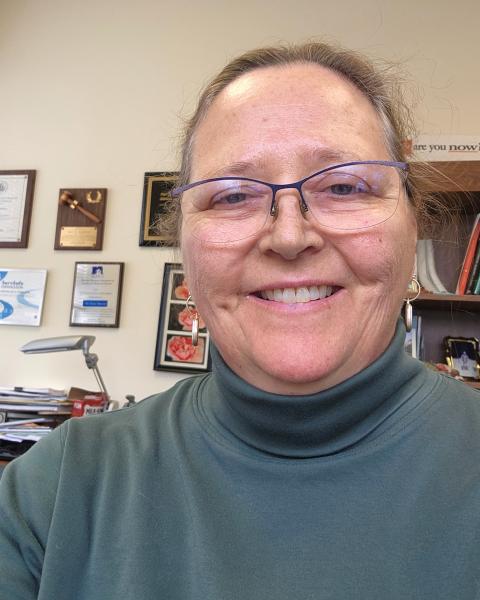COVID-19 Precautions from Field to Market

The point of COVID-19 precautions in the field and at the market is to spend as little time in close contact with others as possible to prevent the potential spread of the virus. Coronaviruses are generally thought to be spread from person-to-person through respiratory droplets. The U.S. Food and Drug Administration (FDA) states: Currently there is no evidence of food or food packaging being associated with transmission of COVID-19.
These precautions are in addition to normal best food safety practices for handling produce to lower the risk of food borne illness from bacteria such as E. coli and Samonella and viruses such as hepatitis A and norovirus.
These extra steps and set ups may take more time but are necessary to help keep staff and customers safe. They will be appreciated by your customers.
In the Field
Stay home if you are sick. Employees should notify their supervisor and stay home if they are sick. Have a contingency plan in place as to who will handle the work or will lead the work in case you are sick. CDC recommends how to determine when a person with COVID-19 or its symptoms can return to work.
Consider wearing a cloth mask to protect others. Cloth and DIY masks are recommended for everyone in public, including farm workers and other food workers. They do not have to be, and should not be, the kind meant for healthcare workers- as they are in short supply. The purpose of wearing a face covering is to help prevent the transmission of coronavirus from individuals who may be infected but are not showing symptoms. CDC recommends the voluntary use of cloth face coverings in public settings where other social distancing measures are difficult to maintain.
The Manager’s checklist of best practices from the Produce Marketing Association (PMA) is a good tool to use as starting point to develop your complete guidelines to prevent the spread of COVID-19 among field workers. You can customize it to your farm’s standards. This PMA companion piece for field worker best practices is in English and in Spanish.
Transporting Produce to Market
The CDC states that transmission of the virus is dependent on distance between employees, the duration of the exposure, and the effectiveness of employee hygiene practices and sanitation.
To support physical distancing, ideally, only the driver should be in the transport vehicle. If this is not possible, CDC recommends effective hygiene practices to reduce the chance of spreading the virus. These practices include wearing cloth face masks, cleaning hands before getting into the vehicle, opening the windows, cleaning and disinfecting the steering wheel, inside and outside door handles and other high touch surfaces in the vehicle before and after traveling in it.
These procedures will help to reduce the risk of an employee transmitting COVID-19 to others.
Setting up Selling Area
We have listed three set ups and other suggested ways to limit close contact with others, to help reduce the spread of COVID-19. You may think of other ways that work for your situation.
In New Hampshire, the Health Department in the city or town where the market is located may have local requirements for your Farmers Market- Their requirements supersede these recommendations. Check here for the List of NH Self-Inspecting Jurisdictions. The Market Manager may have additional requirements.
Wearing cloth masks will help to keep you and your customers from spreading the virus if you are unknowingly infected but feel fine and are not showing symptoms.
Use new plastic bags for packing and selling produce. Remember, by order of NH Governor Sununu, reusable plastic or fabric bags cannot be used at this time.
Consider pre-priced, pre-bagged produce to limit time spent in close contact with customers. If possible, consider offering customers a couple of quantity choices per produce variety, for example, two zucchinis per bag or four per bag or ¼ lb. of beans per bag or ½ lb. per bag. Customers have different needs and budgets.
Clean hands after each customer interaction. Have a bottle of hand sanitizer available for staff and another one for customers to use. Consider building a portable hand washing station. When to use your handwashing station at the Farmers Market - Michigan Farmers Market Association video is an excellent training tool.
Glove use is not required for handling produce and is not a substitute for hand washing. If gloves are used for handling payments, they must be discarded in a waste basket and hands washed before handling produce. Hands must also be washed before putting on clean gloves. At all times, follow CDC guidelines for proper removal of disposable gloves to prevent contamination.
Customer Care in the Selling Area
Use these free POSTERS for Farmers’ Markets precautions from NH Dept. of Agriculture, Markets & Food
Handling Payments
Have two staff members present: one for handling payments and one for handling food and bagging items. This is to speed up transactions and limit the time spent in close contact with others.
If that’s not possible, wash hands or use hand sanitizer after handling money and before handling produce for next order.
Encourage credit/debit card use over cash. Remove the signature requirement for credit card sales where possible. Consider adding virtual payment options.
Utilize card readers that allow customers to swipe their own credit cards, to protect both you, your staff and the customers.
After each food or payment transaction, use a handwashing station or hand sanitizer and disnfect surfaces and POS systems with bleach solution or other disinfecting solution or disinfecting wipes. Read the label carefully and follow label directions and usage information.
Selling Area Set up #1:
Do not allow customers to select their own produce. To minimize close contact, only you will handle the produce with clean hands.
Set up a large easy-to-read poster with product listing and prices. If you have more than 6 or 7 products to offer, use an individual sign for each product, indicating price and sale unit. Customers should be able to read signage from a distance while waiting in line.
Customers will tell you the products they want, and you will select them, place them in a clean plastic bag, and place it on a cleaned table, 6 feet away from your produce table.
Handling Payments for Set Up #1
Customers will pick up their bagged order from the table and leave their payment: exact change or credit card if you accept them. Round product price for even change to make the transaction swift.
You pick up the payment and step back to your product table to process. Then quickly return the card to them if they paid with a card.
Selling Area Set Up #2:
Only one customer can shop at a time.
Use a large product and pricing poster or large individual product price signs as above.
Mark 6 feet from your table with chalk or tape and have customers wait there for their turn to shop. Work with the market manager as to any additional guidelines.
If a line forms please remind customers to leave 6 feet distance. Limit one customer in the sales space at a time.
Handling Payments for Set Up #2
Use the same payment steps noted above to limit length of time in close contact with customers.
Selling Area Set up #3
Consider customer prepay options so customers can come to the market for pick up only.
If you have a Facebook page or other social media that you advertise on, share your product list and pricing early and often so customers can come prepared or even prepay and will be able to limit time spent at your booth. Update your website or Facebook page as often as needed with product varieties as the season changes.
Additional Tips
Bring trash receptacles for disposing of gloves, wipes, etc.
On your website or Facebook page, offer recipes for your product to virtually engage with customers.



